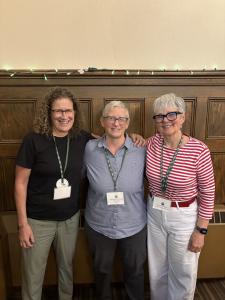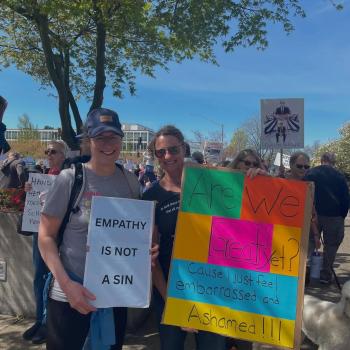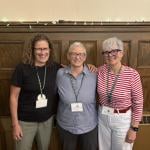Over the past several weeks, I’ve given several public presentations about a topic I’m increasingly interested in exploring: the ways disinformation is used to dehumanize and divide people, and the imperative of Christians to be, in the words of George Fox, valiant for the truth. The venues in which I presented were fairly diverse: sharing at the Newberg City Club, a nonpartisan, nonsectarian community organization; preaching at Salem (Ore.) Mennonite Church; and then speaking on a panel at the Mennonite/s Writing Conference in Winnipeg, Manitoba.
Despite these diverse audiences, one sensibility prevailed in the responses and questions that followed my presentations. We are all swimming in disinformation, a tsunami of lies that can easily drown us in despair, if we aren’t careful. We long to have tools that can help us know what is real, and what is manufactured for outrage. And, we are desperate for leaders who value truth, journalists who report the truth, and communities who seek the truths that can unify rather than divide us.
“Words that Divide and Unify” was the name of my panel presentation at the Mennonite conference in Winnipeg, and I shared the dais with two amazing activists who are using their writing skills and energy to counter the ugly power of empire and the ascendency of Christian nationalism in their home communities. Although we planned this panel in October, before we truly knew how ugly empire’s power might be, these women gave me a renewed hope that Truth will prevail in the United States, and that good will overcome evil.
Hope Nisly, an emeritus librarian at Fresno Pacific University, talked about the efforts she’s making in California, including Get Out the Vote campaigns that required significant emotional and physical fortitude, especially in the Central Valley’s intense heat. I’ve gotten to know Hope over the last few years as a mentor who meticulous gathers information to find truth; and I appreciated especially her reference to other writers who helped her understand the moment we’re in, including Rebecca Solnit’s Hope in the Dark (2004), and Alison Luterman’s poem, “Praise the Broken Promise of America.” Hope is using her writing, her energy, and her compassion to unify her community, making a difference locally and nationally.
My writing guru and friend, Shirley Showalter, one-time president of Goshen College, spoke about the organizing she continues to do in Lititz, Penn., after the school board there began a slide into MAGA-ideology, much as my home community had a few years earlier. In 2023, Shirley attended a Moms for Liberty national convention incognito, and wrote about the experience for WHYY in Philadelphia. Shortly thereafter, Shirley started Grandmas for Love with two other women, and gave birth to an activist movement premised on values of love, peace, diversity and inclusion, and neighbor care. Like Hope, Shirley is using her writing, her energy, and her compassion to make a difference locally and nationally.
I spoke about the events in my hometown that have animated my writing for the last four years, both on this blog and in other community spaces: A school board election that seated alt-right board members who seemed to care more about appeasing their base than the welfare of all children in our district. A conspiracy theorist who spread misinformation intended to divide our community. The cooperation and coordination of numerous people, from different ideological backgrounds, working together to restore a school district, restore trust in our town’s institutions, and rebuild a better, stronger, more inclusive community.

The women with whom I presented—and, more broadly, the conference—gave me a few days’ dose of hope, at a time when I often feel consumed by bad news and by despair. Of course, I’m not naïve. I know that one small panel at one small Mennonite writing conference will not transform the current political climate.
But the passionate and compassionate hearts of my co-presenters reflect a broader movement happening in communities across the United States, where folks are building systems of resistance to fight the chaos, division, hate, and anger that constitutes our MAGA-inspired government leaders. The No Kings protests on June 14 reflect this impulse: five million (plus) people nationwide, in big cities and small towns, standing together to repudiate a Donald Trump presidency that has caused so much anguish to too many. On that day, the protest signs, and chants, and social media posts were using words to unify people, too. Another reason to hope.
On that same day, in Minnesota, two Democratic leaders and their spouses were killed by a man with alleged ties to Christian nationalism and the New Apostolic Reformation. Writing for the New York Times, David French notes that the man who killed Melissa Hortman and her husband was part of a trend; French traces NAR theology to a kind of extremism that sees Trump as a God-ordained leader, like the biblical Jehu (this thread extends all the way to an unalloyed support of Israel as a precursor to the second coming). In this line of thinking, anyone who opposes Trump opposes God. French, a conservative Christian in his own right, says that “America’s Christian extremists are killing people, threatening and intimidating public servants and other public figures who oppose Trump and trying to drive their political opponents from the public square.”
Less than 24 hours after their assassination, Senator Mike Lee of Utah posted several images on X that seemed to mock Hortman’s death, calling the alleged killer a “Marxist,” and making a dig at Minnesota governor Time Walz. After three days of relentless criticism, Lee erased the Tweets, but the impact of his carelessness remained: He was using words to divide us, rather than unifying people around the grief that two much-loved people were gone, their children orphaned, because of political violence.
Words meant to divide and words meant to unify: I cannot help but imagine what our communities would look like now if there were more people acting like Hope and Shirley, and far fewer acting like politicians craven for power and attention and division, no matter the costs.












